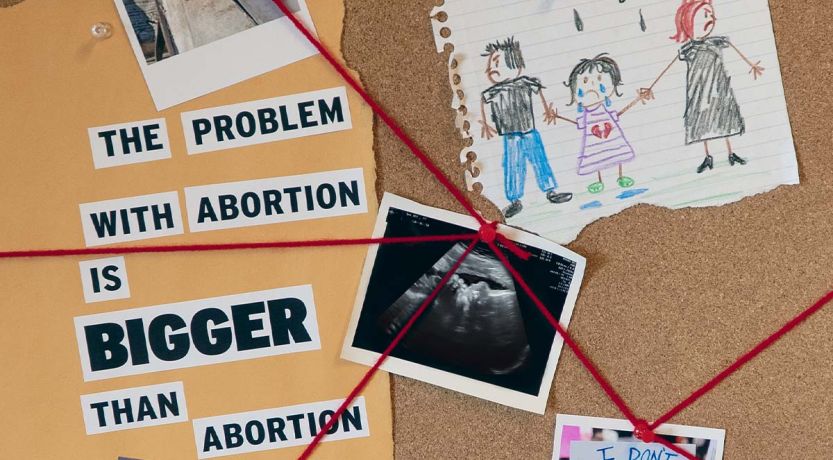There are few more contentious topics than abortion. For Christians, it’s easy to see why abortion needs to end—but just ending abortion isn’t enough.
If I showed you a lever and told you that pulling it would end abortion forever, what would you do?
I think most Christians I know would pull it without taking the time to blink.
But if you did pull that lever—if you put an end to abortion, once and for all—would it solve all the problems? Would it cause all the men who fathered these children to step up and become good fathers? Would it prevent the mothers forced to keep their child from resenting the child? Would it even convince the mothers to give up their babies for adoption?
Would it stop all the premarital sex fueling abortion? Would it fix the broken society and end all the attacks on the family?
What does the Bible say about abortion?
The Bible doesn’t explicitly address abortion, but it’s not hard to decipher where God stands on the matter:
The Sixth Commandment forbids us from taking the lives of other human beings. There is a trove of verses in the Bible making it clear that fetuses growing in the womb are human beings.
Rebekah, pregnant with twins, was concerned when “the children struggled together within her” (Genesis 25:22), only to discover that “two nations are in your womb, two peoples shall be separated from your body” (verse 23, emphasis added). These weren’t just clusters of cells—God was already describing them as the future forefathers of great nations.
David the king, Jeremiah the prophet, and Paul the apostle all wrote about God’s relationship with them while they were still unborn.
David wrote, “Your eyes saw my substance, being yet unformed. And in Your book they all were written, the days fashioned for me, when as yet there were none of them” (Psalm 139:16).
God told Jeremiah, “Before I formed you in the womb I knew you; before you were born I sanctified you” (Jeremiah 1:5).
Paul explained that God “separated me from my mother’s womb and called me through His grace” (Galatians 1:15).
They did not become living human beings during this process. They were already living human beings.
When Mary (who was pregnant with Jesus Christ) visited her cousin Elizabeth (who was pregnant with John the Baptist), Elizabeth remarked how “the babe leaped in my womb for joy” (Luke 1:44). John was “filled with the Holy Spirit, even from his mother’s womb” (verse 15). And what Christian would argue that the unborn Jesus Christ only became the Son of God once Mary gave birth to Him?
Even Old Testament law makes the distinction clear:
“If men fight, and hurt a woman with child, so that she gives birth prematurely, yet no harm follows, he shall surely be punished accordingly as the woman’s husband imposes on him; and he shall pay as the judges determine. But if any harm follows, then you shall give life for life, eye for eye, tooth for tooth, hand for hand, foot for foot, burn for burn, wound for wound, stripe for stripe” (Exodus 21:22-25).
If an unborn child was somehow not a living human being, then the idea of giving “life for life” would be a ridiculous one. But here, in this law, we believe God makes it clear that the life of an unborn child is on a par with the life of a grown adult.
Murder is a sin. Abortion is murder. Abortion is a sin.
Reconciling the facts
Pulling the lever seems like such an obvious choice. Abortion is one of those clear-cut problems with little room for shades of gray. Sure, people talk about edge cases, but the overwhelming majority of abortions are a matter of convenience—an attempt to sidestep the natural consequence of a consensual act. Every year, millions—millions—of babies are murdered, many of them ripped piece by piece from their mothers’ wombs.
It is horrible.
God hates it.
It seems obvious that putting an end to abortion, once and for all, would make the world a better place—a place more aligned with the laws and the mind of God.
A deeper problem behind abortion
But the problem with abortion is bigger than abortion.
We can get so fixated on the awful reality of abortion that we don’t stop to realize that it’s only the tip of the iceberg. Removing it would only reveal some of the deeper, far more twisted problems that lie beneath.
As Christians, we say we want to see an end to abortion—and we do. But what we really want is something more than that. We want a change of heart. We want to see a world transformed by God’s way of life.
So many of the babies that are dying in abortion clinics now would instead be growing up in homes where they would be unwanted, unloved—even abused.
We can’t pretend that forcing parents to keep their children alive would somehow guarantee a positive life for those children. And we can’t place all the emphasis on the fact that these children deserve to live—we need to place just as much emphasis on the fact that they deserve a life worth living.
They deserve a solid, dependable family unit. They deserve a home where they feel safe and loved. They deserve to be protected from the warped and twisted things of this world. And they deserve, above all, loving and compassionate guides who will teach them about God’s way of life—“when you sit in your house, when you walk by the way, when you lie down, and when you rise up” (Deuteronomy 6:7).
The lever to stop all abortions can’t give them that. No law or decree of man can make that happen.
But there is Someone who can.
How abortion will finally end
Make no mistake, the lever should be pulled. It absolutely must be pulled—and one day, it will be.
But the lever isn’t enough.
As Christians, we say we want to see an end to abortion—and we do. But what we really want is something more than that.
We want a change of heart. We want to see a world transformed by God’s way of life—a world where “nation shall not lift up sword against nation, neither shall they learn war anymore” (Isaiah 2:4), where “everyone shall sit under his vine and under his fig tree, and no one shall make them afraid” (Micah 4:4).
That world—and that change of heart—is coming. One day, an angel will cry out that “the kingdoms of this world have become the kingdoms of our Lord and of His Christ, and He shall reign forever and ever!” (Revelation 11:15). Jesus Christ and His saints will begin the process of creating a world where “they shall not hurt nor destroy in all My holy mountain, for the earth shall be full of the knowledge of the LORD as the waters cover the sea” (Isaiah 11:9).
Children will be loved. They will be protected. They will be cared for. And in that world where war has ended, where no one is made to be afraid, where destruction is forbidden, we will see a beautiful thing: “The streets of the city shall be full of boys and girls playing” (Zechariah 8:5).
Read more about this coming reign of Jesus Christ in our free booklet The World to Come: What It Will Be Like.
Sidebar: What If You’ve Already Had an Abortion?
If you’ve already had an abortion, there’s precious little comfort in reading an article about what a terrible sin abortion is.
You probably don’t need any convincing.
You’re probably looking for a way to move forward and find peace.
The apostle Paul asked the Corinthians, “Do you not know that the unrighteous will not inherit the kingdom of God? Do not be deceived. Neither fornicators, nor idolaters, nor adulterers, nor homosexuals, nor sodomites, nor thieves, nor covetous, nor drunkards, nor revilers, nor extortioners will inherit the kingdom of God. And such were some of you” (1 Corinthians 6:9-11).
These words, on their own, are not encouraging ones. Here is a reminder that sin—all sin—prevents us from entering the Kingdom of God. It cuts us off from our Father in heaven and erodes our relationship with Him.
But Paul didn’t say, “And such are some of you,” did he? He said were. “Such were some of you.”
Past tense. Labels that held truth once, but no longer. Some of the Corinthians had been these things—but they weren’t now.
Why? What changed?
“But you were washed, but you were sanctified, but you were justified in the name of the Lord Jesus and by the Spirit of our God” (verse 11).
These sins were behind the Corinthians. They were forgiven, they were absolved, and they were clean in the eyes of God. Their past sins no longer defined them. John wrote, “If we walk in the light as He is in the light, we have fellowship with one another, and the blood of Jesus Christ His Son cleanses us from all sin” (1 John 1:7).
Not “some sins.”
Not “the sins we consider forgivable.”
All sin.
James wrote that “whoever shall keep the whole law, and yet stumble in one point, he is guilty of all” (James 2:10)—a sobering thought, but one that he accented with these words: “Mercy triumphs over judgment” (verse 13).
Judgment comes first—we’re all guilty of sin. The only way to remove that guilt is through repentance—seeking God’s forgiveness and committing to changing our ways. And when we repent, God’s mercy (forgiveness we don’t deserve) triumphs over His judgment (the punishment we do deserve).
There is no sin so small that it can’t separate us from God—and there is no sin so big that God cannot forgive it.
There is no sin so big that God cannot make you clean again.
Genuine repentance and baptism are key components in this process of finding forgiveness through the blood of Christ (Acts 2:38), and you can learn more about it in our article “What Is Forgiveness of Sins?”
Because of that forgiveness, who you were doesn’t have to remain a part of who you are. It doesn’t mean you’ll forget about the past or never feel pain from it again—but what you’ve done isn’t a burden of self-loathing that God expects you to carry around in an act of continual penance.
The penalty for your sin—for all sin—has been paid. The way forward is open, and God is waiting for you with open arms.






